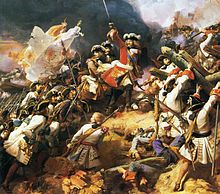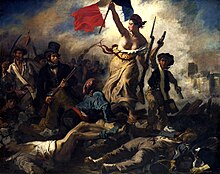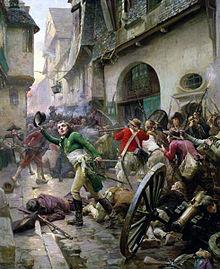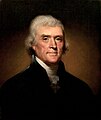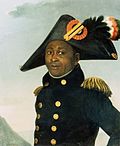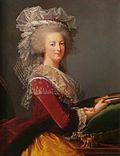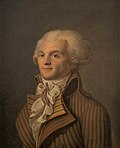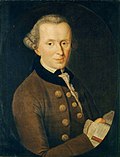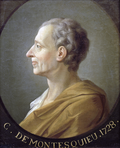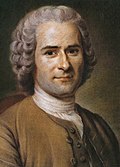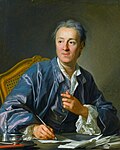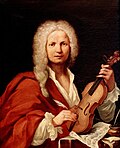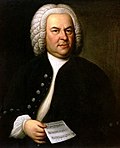Century XVIII
The 18th century d. C. (eighteenth century AD) or 18th century and. c. (eighteenth century CE) was the eighth century of the 2nd millennium in the Gregorian calendar. It began on January 1, 1701, and ended on December 31, 1800.
In Western history, the 18th century is also called the Age of Enlightenment >", due to the birth of the intellectual movement known as the Enlightenment. In this context, the 18th century is fundamental to understanding the modern world, since many of the political, social, economic, cultural and intellectual events of those years have extended their influence to the present day.
For various historians of Western historiography, it is the last of the centuries of the Modern Age and the first of the Contemporary Age, conventionally taking the years 1705 (steam engine), 1751 ( L'Encyclopédie), 1776 (American Independence) or, more commonly, 1789 (French Revolution).
After the political and military chaos of the 17th century, the XVIII, not without its conflicts, saw a notable development in European arts and sciences at the hands of the Enlightenment, a cultural movement characterized by the reassertion of the power of human reason against faith and superstition. The old social structures, based on feudalism and vassalage, will be questioned and will end up collapsing, while, especially in England, the Industrial Revolution begins and the economic takeoff of Europe. During this century, the Western European civilization will strengthen its predominance in the world and extend its influence throughout the world.
Events
1700s
- 1700-1721 The Great Northern War begins between the Tsarist Russia and the Swedish Empire by supremacy in the Baltic Sea.
- 1701 Frederick I became king of the Kingdom of Prussia.
- 1701 Osei Kofi Tutu I forms the Empire asante.
- 1701 The younger brother of Louis XIV, Philip I of Orleans, died.
- 1701 Philip of Anjou comes to Spain, and is crowned as Philip V of Spain, after the death of Charles II.
- 1701 The French founded the city of Detroit in the current United States.
- 1701-1702 The Daily Courant and The Norwich Post become the first newspapers in England.
- 1702-1715 In France the Rebellion Camisard is released.
- 1702 Austria (partidaria del Archiduque Carlos), declares the war to France and Spain (partidarias de Felipe de Anjou). Thus begins the Spanish War of Succession.
- 1702 Felipe de Lorena, the best known lover of Felipe de Orleans, the younger brother of Louis XIV.
- 1703 In Japan 47 rōnin attack Kira Yoshinaka and then eat harakiri.
- 1703 In the north of Europe the Great Storm of 1703 is produced—the most violent recorded in the history of the British Islands.
- 1703 St.Petersburg is founded by the Great Peter who would be the capital of the Russian Empire until 1918.
- 1703-1711 The War of Independence of the Rákóczis against the Monarchy of the Habsburgs.
- 1703 In Russia the village of Saint Petersburg is founded.
- 1703 In Italy, the musician Antonio Vivaldi is ordained a priest.
- 1703 Isaac Newton is responsible for the custody of the Coin House and is elected for the first time president of the Royal London Society.
- 1703 Posthumous Publication of the Dióptrica Christian Huygens.
- 1704 Ends the period Genroku in Japan.
- 1704 British philosopher John Locke died.
- 1704 The Battle of Malaga takes place in the framework of the Spanish War of Succession.
- 1704 The Rock of Gibraltar becomes part of the United Kingdom thanks to George Rooke, during the Spanish Succession War.
- 1704 The first war of Javanese succession is waged.
- 1705 Almira George Frideric Handel's first opera, he's in the air.
- 1705 Louis XIV de France asedia Nice to later conquer it.
- 1705 The English Crown grants Isaac Newton the title Sir.
- 1706 Benjamin Franklin was born, one of the founding fathers of North America.
- 1706 During the war of the Spanish succession French troops are defeated in the battles of Ramillies and Turin.
- 1706 The composer Johann Pachelbel died.
- 1707 In Portugal, John V is crowned king.
- 1707 The Union Act, which merges the Scottish and English parliaments, thus establishing the Kingdom of Great Britain, is adopted.
- 1707 After the death of Aurangzeb, the Mogol Empire enters a long decadence and the Maratha Empire replaces it slowly.
- 1707 Mount Fuji explodes in Japan for the first time since 1700.
- 1707 The 27-year war between the Marathas and the Mogoles in India is over.
- 1708 The British East India Company and the English company that negotiates in India merge to market in the east of India.
- 1708-1709 Hunger kills one third of the population of East Prussia.
- 1708 Johann Sebastian Bach is elected chamber musician and organist in the Weimar court.
- 1708 Modification of the Cyrillic alphabet, which adopts its current form (except four letters).
- 1709 The great 1709 frost marks the coldest winter in 500 years.
- 1709 Battle of Poltava in Ukraine: the Russians are victorious against the Swedes.
- 1709 The Hotaki dynasty was founded in Afghanistan.
- 1709 Charles XII of Sweden flees the Ottoman Empire after Peter I of Russia defeated his army in the battle of Poltava.
1710s
- 1710 The first global legislation on copyright, the Statute of the Queen of Great Britain, entered into force.
- 1710 Last great reform of the Palace of Versailles, during the reign of the Sun King.
- 1710 Georg Friedrich Händel became the orchestra director of the Hanover court.
- 1710-1711 The Ottoman Empire fights Russia in the Russian-Turkish war.
- 1710 Louis XV, the great-grandson of Louis XIV, was born and became the future king after the death of his great-grandfather.
- 1711 The Peace of Szatmár is signed, which puts an end to the struggles of almost two centuries between Austria and Hungary and recognizes the freedoms of this.
- 1711-1715 The war of Tuscarora was waged between British, Dutch and German settlers and the Tuscarora people in North Carolina.
- 1711 Charles VI of Germany is proclaimed Emperor of the Holy Roman-German Empire.
- 1711 Louis of France died, known as the Grand Dolphin and son of Louis XIV, making the grandson of this, Louis XV.
- 1711 Born Frederick the Great of Prussia
- 1712 During the war of Spanish succession the French defeat a combined Dutch-Ustriaca force in the battle of Denain.
- 1712 The Newcomen Machine is created by Thomas Newcomen, advised by the physicist Robert Hooke and by the mechanic John Calley.
- 1712 The first shipment of Java coffee arrives in Amsterdam.
- 1713 The Sálica Act prohibiting women ' s access to the French throne is enacted.
- 1713 The Utrecht Treaty was signed with which the war of the Spanish Succession would end the following year.
- 1713-1714 Tarabai establishes the Kolhapur government against Chattrapati Shahu of the Marathian Empire.
- 1713 In Madrid, Spain, the first official session of the Spanish Royal Academy is held in the house of its founder, Juan Manuel Fernández Pacheco.
- 1714 George I ascends to the throne of Great Britain.
- 1714 The typewriter is patented (which is manufactured years later).
- 1714 Ends the Spanish War of Succession, after almost 15 years of conflict.
- 1714 George I of England is crowned king of Great Britain and Ireland, the first king of the house of Hanover.
- 1714 Gabriel Fahrenheit invents the mercury thermometer.
- 1715 The first Jacobite uprising stalls; the British stop the Jacobin advance in the battle of Sheriffmuir and in the battle of Preston.
- 1715 The Minimum of Maunder ceases. During this period the sunspots disappeared from the solar surface.
- 1715 Spain and Portugal sign the Peace of Utrecht.
- 1715 Louis XIV, the King SunHe dies, leaving France expanded but deeply indebted. Regency takes power under Philip II of Orleans.
- 1715 Louis XV acceded to the French throne, he did not change his monarch in France for almost eighty years.
- 1715 Pope Clement XI declares Catholicism and confucianism incompatible.
- 1716 Implementation of New Plant Decrees in Catalonia, concluding the unification of Spain under Felipe V.
- 1716 Born Carlos III of Spain, the mayor of Madrid.
- 1716 The Sikh Confederation is established along the current Indian-Pakistan border.
- 1716 The Kangxi Dictionary is published.
- 1717 The Netherlands, Great Britain and France sign the Triple Alliance.
- 1717 Four operational lodges are assembled and the Great United Lodge of England is founded, the basis of the current modern Freemasonry.
- 1717 In the North Sea, a cyclic tide affects the coasts of Germany, Scandinavia and the Netherlands. About 14,000 people die.
- 1717 Surabaya rebels against the Dutch East India Company.
- 1717 Spain violates the Treaty of Utrecht and is temporarily made with the control of Sardinia.
- 1718 The city of New Orleans is founded by the French in North America.
- 1718 Lieutenant Robert Maynard of the British Royal Navy murders the pirate Barbanegra in a naval battle over her ship the Revenge of Queen Anne near the south of the Ocracoke Islands.
- 1718-1730 period of tulips of the Ottoman Empire.
- 1718 In Gansu Province, China, an earthquake of 7.5 degrees on the Richter scale leaves a balance of 75 000 victims.
- 1718 Carlos XII of Sweden would be killed after being shot in the head during a night inspection in the trenches.
- 1719 The Spanish attempt to restart the Jacobite rebellion fails.
- 1719 In England the novel is published Robinson Crusoe Daniel Defoe.
- 1719 The Second War of Java Succession is waged.
1720s
- 1720 The infinitesimal calculation, a fundamental tool in physics and engineering, is deeply developed by the need to advance in the theory of differential equations, fundamental in physics.
- 1720 The actions of the South Sea Company rise from one hundred pounds per action to nearly one thousand pounds per action.
- 1720 the Spanish army embarked on the Villasur expedition, travelling north of Mexico to the Great Plains.
- 1720-1721 The great plague of Marseilles occurs, the last outbreak of the bubonic plague in Europe.
- 1720 In London Edmund Halley is named as a real astronomer.
- 1720 he and the pirates, Anne Bonny, Mary Read and Calico Jack are captured and imprisoned, the two women would be saved from death while the latter would be hanged.
- 1720 Fails the Law System.
- 1721 In Rome, Cardinal Conti is elected Pope with the name of Inocencio XIII.
- 1721 Jeanne Antoinette Poisson, known as Madame de Pompadour and favorite lover of Louis XV.
- 1721 Robert Walpole becomes the prime minister of Great Britain.
- 1721 The Treaty of Nstad is signed which ends with the Great Northern War.
- 1721 The French painter Antoine Watteau died.
- 1721 Emperor Kangxi forbids Christian missionaries by the decree of Pope Clement XI.
- 1721 Peter I Reform to the Russian Orthodox Church.
- 1721 Peter I becomes a tsar of all Russias.
- 1721 The pirate Mary Read died, after surviving her capture, after this her pirate partner Anne Bonny would retire from piracy with all the money stolen in the blows.
- 1721 Johann Sebastian Bach composes Brandenburg Concerts.
- 1722 The Afghans conquer Iran, overthrowing Safavid Shah Sultan Husayn and collapsing the Safaví Empire.
- 1722 The emperor of China of Kangxi dies.
- 1722 Jhon Churchill died, I duke of Marlborought.
- 1722 The Dutch explorer Jakob Roggeveen arrives on Easter Island.
- 1722 Pirate Bartolomew Roberts dies in a naval battle off the African coast.
- 1722-1723 Russian-Persian War.
- 1722-1725: Irish economic independence from the movement of England begins.
- 1723 slavery was abolished in Russia; Peter the Great converts domestic slaves into servants of the house.
- 1723-1730 The Zungarians invade the territories of Kazakhstan.
- 1723 Vivaldi composed the four seasons, his best known work.
- 1723 The Russian-Persian War ended with the Russian victory.
- 1724 Louis I, the son of Philip V, was proclaimed king of Spain.
- 1724 The Treaty of Constantinople was signed, dividing Persia between the Ottoman Empire and Russia.
- 1724 Opera premieres Giulio Cesare by Georg Friedrich Händel in London.
- 1724 In Rome, Cardinal Orsini is elected Pope with the name of Benedict XIII.
- 1725 Fulani nomads take full control of the territories of jihads fulani.
- 1725 Born Giacomo Casanova, adventurer and writer.
- 1725 The dentist Lazare Riviere proposes the use of nail oil due to its sedative properties for teeth treatment.
- 1726 The huge Chinese encyclopedia is printed Gujin Tushu Jicheng, of more than 100 million Chinese characters written in more than 800,000 pages, is printed in 60 different copies using the Chinese mobile print based on copper.
- 1726 Gulliver travels by Jonathan Swift are published.
- 1726 The decay of the golden age of piracy begins.
- 1726 "The discourse in defense of women" is published by Father Benito Jerónimo Feijoo. One of the foundational texts of feminism.
- 1727-1729 Anglo-Spanish War.
- 1727 The Cambrai Congress ends among the main European powers.
- 1727 George I, king of Great Britain, died.
- 1727 George, Prince of Wales, is proclaimed King George II of Great Britain.
- 1727 New empirical evidence of heliocentric theory, working with the speed of light on the moons of Jupiter. The first approximate measurement of the speed of light is performed.
- 1727 The English physicist, mathematician and philosopher Isaac Newton died, due to a nephrical colic. Newton would be considered one of the revolutionaries of physics.
- 1728 The Copenhagen Fire of 1728, the largest fire in the history of the city, takes place.
- 1728 The Danish explorer Vitus Jonassen Bering discovers the Bering Strait.
- 1728 James Bradley discovers astronomical aberration.
- 1728 The conqueror James Cook is born.
- 1729-1735 Charles Wesley and John Wesley begin Methodism in England.
- 1729 Tahmasp Qolí, the future Nader Shah, overcomes in Herat the Abdalite pastunes on account of the Tahmasp II safaví.
1730s
- 1730 Mahmud I takes the Ottoman Empire after the Halil Patrona revolt, ending the Tulip period.
- 1731 Tahmasp Qolí Jan launches an offensive against the Ottoman Empire, with which he will in two years recover most of the territories lost by the Safaví dynasty during the Afghan occupation.
- 1730-1760 The First Great Awakening takes place in Britain and North America.
- 1730 Death of Pope Benedict XIII.
- 1730 In Rome, Cardinal Corsini is elected Pope with the name of Clement XII.
- 1730 On the island of Lanzarote (Islas Canarias) the Timanfaya volcano enters eruption.
- 1731 In England John Hadley invented the sixth.
- 1731 American astronomer Benjamin Banneker is born.
- 1731 In Beijing, China, there is an earthquake that leaves over 100,000 victims.
- 1732-1734 Crimean Tatar Incursions in Russia.
- 1732 First performance of the work Orlando by Georg Friedrich Händel in London.
- 1732 George Washington, father of the United States of America, was born.
- 1732 The governorate of Sonora and Sinaloa was established in Mexico by Real Cédula.
- 1732 Carlos Linneo travels to Lapland.
- 1732 Joseph Haydn, classic Austrian composer
- 1733-1738 War of Polish succession.
- 1733 John Kay invents the flying shuttle.
- 1733 Se estrena en Leipzig el Magnificat en Re mayor BWV 243 de Johann Sebastian Bach.
- 1733 The troops of Tahmasp Qolí Jan are defeated in Baghdad by the Ottoman Topal Osman Pasha.
- 1733 Signed the first family pact between Spain and France
- 1733 Joseph Priestley, English scientist, oxygen discoverer
- 1734 Voltaire publishes his work Philosophical Letters, after this fact the process of illustration in Europe would begin.
- 1734 Battle of Bitonto: Montemar defeats the Austrians and Spain thus reconquers the Kingdom of Naples.
- 1734 Philip V gives his son Charles, by decree, all the rights to the throne of Naples and Sicily.
- 1734 Die the legendary Scottish hero Rob Roy MacGregor.
- 1735-1739 Russian-Turkish war.
- 1735 George Hadley studied in depth the air current.
- 1735 A long site begins at Colonia del Sacramento, which would last until 1737.
- 1735 Tahmasp Qolí Jan signed with the Russians an agreement by which they undertook to withdraw from the Persian territories of the Caucasus.
- 1735-1799 Chinese Emperor Qianlong oversees a large expansion in the territory.
- 1735 The governor-general Dirck van Cloon died, one of the many victims of malaria in Batavia.
- 1735 Jhon Adams was born one of the founding fathers of the United States.
- 1736 In this year British astronomer and theologian William Whiston calculated that a comet would collision with the Earth, causing the end of the world.
- 1736 In Iran, Tahmasp Qolí Jan is crowned shah.
- 1736 Born James Watt, inventor of the steam machine
- 1736 Nader Shah assumes the title of Sha of Persia and covers the Afsharid dynasty; He rules until his death in 1747.
- 1736 The painters of the Chinese court of the Qing dynasty recreate the classic panoramic painting of Zhang Zeduan, The Qingming festival by the river.
- 1737 In Russia, the Kamchatka peninsula is shaken by a violent earthquake of 9.3 degrees of Richter's seismic scale. It is considered the second most powerful earthquake in human history.
- 1737 The Italian Lutier Antonio Stradivari dies.
- 1737 The people of Panama (now the capital of the Republic of Panama) are destroyed by a terrible fire, which was called the Big Fire.
- 1737 John Harrison creates the first marine chronometer capable of calculating the length.
- 1738-1756 Hambruna in the Sahel; half of the population of Timbuktu dies.
- 1738 The first stone of the Royal Palace is placed in Madrid (Spain).
- 1738 Pope Clement XII forbids Catholics to become Franciscans.
- 1738 Muere Turlough O'Carolan, famous Irish arpist.
- 1738 In Italy, 15 km from the southeast of Naples begins the excavation of Herculano, becoming one of the first archaeological works.
- 1738 John and Charles Wesley create the Methodist religion.
- 1738 The successor to the British throne Jorge III is born.
- 1738 Pierre Louis Maupertuis public South the figure of the Earth, confirming Isaac Newton's theory that the Earth is a spheroid beset by the poles.
- 1738 Polish king Stanislas receives the duke of Lorena in exchange for his resignation from the throne of Poland.
- 1739 Nader Shah defeats the Mogols in the Battle of Karnal and plunders Delhi.
- 1739-1748 The War of the Sea between Great Britain and Spain is waged by the supremacy of the Caribbean.
- 1739 The Viceroy of New Granada is definitively restored.
1740s
- 1740 Frederick the Great comes to the power of the kingdom of Prussia.
- 1740 According to the legend on the beach of Benidorm (Spain) is the Virgen del Sufragio.
- 1740 British attempt to capture St Augustine in Florida during the site of St Augustine but lose to the Spaniards.
- 1740-1741 Hunger in Ireland kills ten percent of the population.
- 1740-1748 Austrian succession war.
- 1740 Charles VI of Germany died, emperor of the Holy Roman-Germanic Empire.
- 1740 A massacre was carried out against the Chinese ethnic Batavia after the Dutch East Indies Company suspected that they planned a rebellion; approximately 10,000 people died and the Chinese neighborhood was burned.
- 1741 Cartagena de Indias Site (1741).
- 1741 Admiral Blas de Lezo died.
- 1741 The Russians begin to settle on the Aleutian islands.
- 1741 Retired from the fleet of the English admiral Edward Vernon, after the disastrous defeat at the Cartagena de Indias site, which was the end of the War of the Sea, confirming the Spanish naval supremacy.
- 1741 The composer Antonio Lucio Vivaldi died.
- 1741 Pope Benedict XIV issues Inmensa Principles against Slavery.
- 1742 Charles VII became emperor of the Holy Roman Empire.
- 1742 Dublin is represented for the first time The Messiah Haendel.
- 1742 Marvel's Mill, the first water-powered cotton mill, begins to operate in England.
- 1742 The rebellion of Juan Santos Atahualpa against the Spaniards.
- 1742 Die Edmund Halley, known for calculating the orbit of the famous Halley comet.
- 1742 Anders Celsius invents the temperature scale that bears its name.
- 1743 Thomas Jefferson was born, who would play an essential role in the United States Declaration of Independence.
- 1743 The capital of the Sultanate of Mataram fell under the uprising of Geger Pecinan, Raden Mas Garendi led the Chinese mercenaries who rebelled against Pakubuwono II.
- 1743 France and Spain signed the second family pact.
- 1743 The noble Madame du Barry is born.
- 1744 Mohammed Ibn Saud founded the first Saudi state.
- 1744 Louis XV de France survives an attempted murder of Robert François Damiens, who was the last person executed in France with the traditional capital punishment used for regicides.
- 1744 The French attempt to restart the Jacobite rebellion fails.
- 1744 Born Gaspar Melchor de Jovellanos, a Spanish politician and writer.
- 1744-1748 The first Carnal War was waged among the British, the French, the Marathas and Mysores in India.
- 1744 The poet Alexander Pope died.
- 1745 The second Jacobite uprising is initiated by Charles Edward Stuart in Scotland.
- 1745 Muere Jonathan Swift, author of the Gulliver Travels.
- 1745 Pakubuwono II establishes a new kraton in the village Sala, along with Surakarta Sunanate.
- 1746 The Lima Earthquake of 1746 takes place.
- 1746 Felipe V of Spain died.
- 1746 Begins the reign of Fernando VI in Spain
- 1746 Johann Heinrich Pestalozzi, pedagogue, educator and reformer Swiss.
- 1746 Francisco de Goya, a Spanish painter, was born.
- 1747 Ahmed Shah Durrani founded the Durrani Empire in present Afghanistan.
- 1747 In the Tower of London (England), Scottish Jacobite Lord Lovat is decapitated by high treason. He was the last person executed this way in that country.
- 1747 Near Maastricht (Belgium), 80 000 French defeat 60 000 Saxons in the battle of Lafelt.
- 1748 The Treaty of Aix-La-Chapelle concludes the War of the Austrian Succession and the First Carnal War.
- 1748 Montesquieu publishes his work The spirit of laws, in which he fosters the separation of powers from the state.
- 1748-1754 the Second Carnal War is waged among the British, the French, the Marathas and Mysore in India.
- 1749 In Denmark the Danish newspaper departs Berlingske Tidendedean of the universal daily press.
- 1749 In Spain the Great Redada takes place.
1750s
- 1750 The systematic study of electric phenomena begins: Cavendish experiments, Franklin pararrhoea, Galvani theory and Coulomb equations.
- 1750 It is booted in Manila the Most Holy Trinity
- 1750 The coldest stage of the small Ice Age.
- 1750 "James Gray" reveals his sex to his fellow Royal Marines.
- 1750 Joseph I of Portugal takes the throne of Portugal of his deceased father, Juan V of Portugal. The new king Joseph Manuel designates the Marquis of Pombal as his general minister, who then strips the Inquisition of his power.
- 1750 The first Shakespearean theatrical production takes place in New York -- an alternative version Ricardo III.
- 1750 Farinelli is appointed knight by King Fernando VI of Spain.
- 1750 The composer Johann Sebastian Bach died.
- 1751 Jean le Rond d'Alembert and Denis Diderot begin to write L'Encyclopédie.
- 1751 In Scotland, Adam Smith is appointed professor of logic at the University of Glasgow
- 1751 The politician James Madison is born.
- 1752 The United Kingdom adopts the Gregorian Calendar, making 2 September followed by 14.
- 1752 Benjamin Franklin discovers the electric nature of lightning.
- 1753 The La Mancha Canal begins to be built.
- 1753 Sweden and Finland adopt the Gregorian Calendar.
- 1753 Benjamin Franklin invents the pararrhoea.
- 1754 The Treaty of Pondicherry ends the Second Carnal War.
- 1754 King's College is founded by a royal letter from George II of Great Britain.
- 1754-1763 Franco-Indian War, the U.S. Chapter of the Seven Years War, is waged in colonial North America, mostly by the French and their allies against the English and their allies.
- 1754 The beginning of the Franco-Indian war in the colonies of North America.
- 1754 Columbia University Foundation in New York City.
- 1754 George Washington surrenders to French troops in Fort Necessity.
- 1754 The future king Louis XVI, grandson of King Louis XV, was born.
- 1755 The earthquake in Lisbon is one of the strongest earthquakes in history.
- 1755-1763 The Expulsion of the Acadians forces the transfer of the French Akkadian population from Nova Scotia and New Brunswick.
- 1755 The Treaty of Giyanti is signed, effectively distributing the Sultanate of Mataram; the Dutch Company of the East Indies recognizes Mangkubumi as Sultan Hamengkubuwana I, who governs half of Central Java.
- 1755 Mary Antoinette of Austria was born, queen consort of France.
- 1755 Edward Braddock is defeated in the battle of Monongahela against India and France, part of the Franco-Indian War of the Seven Years.
- 1756 Wolfang Amadeus Mozart, one of the greatest composers of world history, was born.
- 1756 Westminster Treaty.
- 1756-1763 The war of the Seven Years is waged among the European powers in several theaters around the world.
- 1756-1763 The Third Carnal War is waged among the British, the French, the Marathas and Mysore in India.
- 1756 At the Palace of Versailles, France and Austria sign the first Versailles Treaty.
- 1756 Frederick II the Great invades Saxony, beginning the war on the continent.
- 1757 Alexander Hamilton was born the founding father of the United States.
- 1757 Plassey's battle marks the beginning of the formal British rule in India after years of commercial activity under the auspices of British East India Company.
- 1757 Salatiga's treaty was signed between Prince Sambernyawa and Pakubuwono III and Hamengkubuwono, the remnant of Mataram's sultanate was more involved; the Grand Duchy of Mangkunegaran was established.
- 1758 British Colonel James Wolfe issues the Manifesto of Wolfe.
- 1758 President James Monroe is born.
- 1758 Maximiliem Robespierre was born.
- 1758 Linneo begins the systematic cataloging of natural species.
- 1759 Charles III became king of Spain and would be the greatest promoter of the Bourbon Reforms.
- 1759 Comet Halley makes his only appearance in the centuryXVIII.
- 1759 The German composer Georg Friedrich Händel died.
- 1759 During the Franco-Indian war, the French commander Louis-Joseph of Montcalm and the British commander James Wolfe died during the battle of Abraham's Plains.
- 1759 Maria Theresia von Paradis, a pianist and composer, was born, and only three years later, she became blind.
1760s
- 1760 King George II of Great Britain died.
- 1760 George III becomes the king of Great Britain.
- 1760 Zand dynasty is founded in Iran.
- 1760 France adopts the Gregorian Calendar.
- 1761 The Marathian Empire beats the Durrani Empire in the battle of Panipat.
- 1762-1796 Kingdom of Catherine the Great of Russia.
- 1762 Jean-Jacques Rousseau publishes his work The social contractwhich deals primarily with the freedom and equality of men under a State instituted by a constitution.
- 1762 The future British king George IV is born.
- 1763 The Treaty of Paris concludes the war of the Seven Years and the third Carnal War.
- 1763 The kingdom of Mysore conquers the kingdom of Keladi.
- 1763 Frederick II of Prussia invents the Echelon Formation.
- 1765 The Seal Act is introduced into the American colonies by the British Parliament.
- 1765 The king of Great Britain is born William IV.
- 1766 In Spain the riot of Esquilache was a massive popular mobilization against King Charles III.
- 1766 Christian VII became king of Denmark.
- 1766-1799 Anglo-Mysores Wars are waged.
- 1767 By order of King Charles III the Jesuits are expelled from the American continent and from Spain.
- 1767 Burmese conquer the Kingdom of Ayutthaya.
- 1768 the Gurkhas conquer Nepal.
- 1768-1772 War of the Bars Confederation.
- 1768-1774 Russian-Turkish war.
- 1769 Napoleon was born Bonaparte.
- 1769 James Watt perfects the steam engine which played a relevant role in moving machines and apparatuses as diverse as pumps, locomotives, marine engines, among others.
- 1769 Beginning of the First Industrial Revolution which machines the work (steam machine, steering shuttle, Spinning Jennyetc.).
- 1769 Spanish missionaries establish the first of the 21 missions in California.
- 1769-1770 James Cook explores and maps of New Zealand and Australia.
- 1769-1773 Bengal's famine of 1770 kills one third of Bengal's population.
- 1769 Clemente XIV takes over the 249th Pope of the Catholic Church, the last pontiff of the century.
- 1769 French Expeditions extract odour nail plants in Ambon, ending the monopoly the Dutch Company of the East Indies.
- 1769 The Court Factor was founded by Mayer Amschel Rothschild.
1770s
- The development of better telescopes allows progress in the astronomical knowledge of the universe, the Messier catalogue is produced; it is postulated on the formation of the solar system (Kant, Laplace,...).
- The first modern weather studies are conducted. Amateurs from all over Europe begin to carry systematic records on climate.
- The first engineering schools emerge.
- 1770 James Cook claims the east coast of Australia (New South Wales) for Britain.
- 1770 The Boston massacre against North American patriots.
- 1770-1771 Hunger in Czech lands kills hundreds of thousands.
- 1770 James Cook stops on Onrust Island in the Bay of Batavia to repair his ship Endeavour on his journey around the world.
- 1770 Fluid mechanics are developed: the Bernoulli, D'Alembert,...
- 1770 Euler opens new branches of mathematics, such as topology, complex calculation,...
- 1770 Ludwig van Beethoven, one of the great composers of history, was born.
- 1771 The Peste Riot is unleashed in Moscow.
- 1771 Richard Arkwright and his partners build the world's first hydraulic mill in Cromford.
- 1772 Johann Friedrich Struense invents the reformer in Denmark.
- 1772 Jean le Rond d'Alembert and Denis Diderot finished writing L'Encyclopédie.
- 1772 Gustavo III of Sweden begins a coup d'etat, becoming almost an absolute monarch.
- 1772-1779 The Maratha Empire fights the British and Raghunathrao forces.
- 1772-1795 The partitions of Poland end the Polish-Lithua Commonwealth and erase Poland from the map for 123 years.
- 1773-1775 The Rebellion of Pugachev, the greatest peasant revolt in the history of Russia.
- 1773 The British East India Company begins operations in Bengal to smuggle opium in China.
- 1773 The tea riot in Boston causes the British to militarily reinforce the Thirteen Colonies.
- 1774 King Louis XV of France died.
- 1775 John Harrison H4 and Larcum Kendall K1 Marine Chronometers are used to measure James Cook's length on his second journey (1772-1775).
- 1775-1782 The first Anglo-Maratha war.
- 1775-1783 The United States War of Independence is underway.
- 1776 Adam Weishaupt covers the Illuminati.
- 1776 The United States Declaration of Independence is adopted by the Continental Congress in Philadelphia.
- 1776 Adam Smith publishes his work The wealth of nations which deals with economic liberalism.
- 1777 The study of solids' behavior begins: Coulomb's friction, Carnot's shock theory, Coulomb's fault criterion,...
- 1778 The Tây S/25070/n dynasty was established in Vietnam.
- 1778 James Cook becomes the first European to disembark on the Hawaiian islands.
- 1778 José de San Martín was born the liberator, in Yapeyú, Virreinato del Río de la Plata.
- 1779 Captain James Cook is killed by Hawaiian natives in Kealakekua Bay, after an attempted kidnapping and rescue of the ruling leader, Kalani'ōpu'u in exchange for a stolen boat.
- 1779 The Xhosa wars between British settlers and the Boer begin in the Republic of South Africa.
- 1779 The Marquis of La Fayette returns to France with revolutionary ideas.
1780s
- 1780 Naturalist expeditions are carried out around the world, giving rise to modern naturalism; Western man strengthens his geographical and natural knowledge of the world, reaching the most hidden places.
- 1780 Münster (Germany) founded the University of Münster.
- 1780-1782 The rebellion of Túpac Amaru II against the Spanish crown in the Viceroy of Peru.
- 1780 In New England (United States) the Dark Day of New England occurs (inexplicable darkening of the visible sky).
- 1780 In Tungasuca (Cusco, Peru) Bando de libertad in which for the first time in America the abolition of slavery is proclaimed.
- 1780 In Madrid, the Spanish Royal Academy publishes the 1.a edition of Spanish language dictionary.
- 1781 The Spanish settlers founded the city of Los Angeles.
- 1781 In the framework of the United States War of Independence, the village of Richmond (Virginia) is set on fire by the bombing of the British Navy led by Benedict Arnold.
- 1781 On the Chataquilla coast (in current Bolivia) the Quechua leader Tupac Katari is murdered by the Spanish.
- 1781 Immanuel Kant publishes his work Criticism of pure reason in which he criticizes the epistemic conditions of human knowledge.
- 1781-1785 The servitude was abolished in the Monarchy of the Habsburgs.
- 1781 In the Plaza de Armas del Cuzco (Virreinato del Perú), the Spaniards execute Tupac Amaru II, leader of the largest anticolonial indigenous rebellion in America during the centuryXVIII.
- 1781 There is a duel of pianistic interpretation between Wolfgang Amadeus Mozart and Muzio Clementi in Vienna and before the presence of the emperorJose II of Austria, of which Mozart was a victor.
- 1781 Opera premiere Idomeneo, king of Crete (KV 366) by Wolfgang Amadeus Mozart.
- 1782 Die Anne Bonny, one of the best known pirates in history.
- 1782 In the United States, Congress approves the design of the nation's emblem: the United States seal
- 1782 Carlos III of Spain recovers Menorca from the hands of the British, but fails in front of Gibraltar.
- 1783 Hambruna in Iceland, caused by the eruption of the Laki volcano.
- 1783 The Russian Empire annexes the Crimean Kanate.
- 1783 The liberator Simon Bolivar is born.
- 1783 The Treaty of Paris formally ends the war of independence of the United States.
- 1784 The future King Fernando VII of Spain is born.
- 1785-1791 Imam Sheikh Mansur, a Czech and Muslim mystical warrior, runs a coalition of Muslim Caucasian tribes from all over the Caucasus in a holy war against Russian settlers and military bases in the Caucasus, as well as against local traditionalists who followed traditional customs.
- 1785-1795 The War of the Northwest of India is waged between the United States and the Native Americans.
- 1787 The United States Constitution is submitted to States for ratification.
- 1787 Freetown slaves from London establish Freetown in Sierra Leone.
- 1787 The Kansei Reforms are established in Japan by Matsudaira Sadanobu.
- 1787-1792 Russian-Turkish war.
- 1788 First French Quaker Community established in Congénies.
- 1788 First permanent European settlement established in Australia by Great Britain in Sydney.
- 1788-1790 The Russian-South war.
- 1788-1789 Inconfidence Mining, conspiracy against the colonial authorities in Brazil.
- 1788 Begins the famine of the winter of 1788 which affects several European countries but mainly France where several peasants die.
- 1789 George Washington is elected the first president of the United States; He serves up to 1797.
- 1789 promulgated Declaration of the Rights of Man and Citizen.
- 1789-1799 The French Revolution.
- 1789 The General States of 1789.
- 1789 The National Assembly.
- 1789 The Constituent Assembly.
- 1789 The taking of the Bastille in the streets of Paris symbolically led to the end of the Old Regime.
- 1789 The revolution of Liejana.
- 1789 Antoine Lavoisier founded modern Chemistry, and disproves the theory of the phologist. Lavoisier's law is set.
- 1789 The revolution of Brabant.
1790s
- The first scientific theories about the emergence of species are developed: Cuvier, Lamarck, Lord Monboddo, Buffon,... Modern biology is founded.
- 1790 The first cast steel is obtained.
- 1790 Modern geodesy is founded.
- 1790 Newtonian mechanics and universal gravitation theory are imposed. At the end of the century, Lagrange proposes the lagrangan synthesis of Newton's equations.
- 1790 The United States of Belgium is proclaimed after the Brabant revolution.
- 1790 Benjamin Franklin, the founding father of the United States, perishes.
- 1790 Abolishment of the United States of Belgium and restoration of Austrian control.
- 1790 Establishment of the Polish-Prussian pact.
- 1791 The Constitutional Law (or the Canadian Law) creates the two provinces of Canada Superior and Inferior in British North America.
- 1791 The composer Mozart died.
- 1791 Repression of the revolution of Liège by the Austrian forces and the re-establishment of the prince-obispado of Liège.
- 1791-1795 George Vancouver explores the world during the Vancouver Expedition.
- 1791-1804 The Haitian Revolution.
- 1792 The First Coalition of European monarchies is formed to contain the French Revolution.
- 1792-1802: The French revolutionary wars cause the Napoleonic Wars, which last from 1803 to 1815.
- 1792 The New York Actions and Changes Board was founded.
- 1792 Polish-Russian War of 1792.
- 1792 King Gustavo III of Sweden is killed by a conspiracy of nobles.
- 1792 The assault on the Tuileries Palace by French revolutionaries.
- 1793 Former Louis XVI of France is guillotined in the square of the revolution.
- 1793 The French revolutionaries desecrate the graves of the kings of France in the Basilica of Saint-Denis.
- 1793 North Canada prohibits slavery.
- 1793 The largest yellow fever epidemic in U.S. history kills 5000 people in Philadelphia, approximately 10% of the population.
- 1793 The former Maria Antonieta of Austria is a guillotine in the square of the revolution.
- 1793-1796 Revolt at the Vendée against the French Republic at the time of the Revolution.
- 1794 Polish revolt.
- 1794 The Jay Treaty between Great Britain and the United States is concluded, whereby Western advances in the Great Lakes return to the United States and trade between the two countries is regulated.
- 1794 The Qajar dynasty is founded in Iran which will replace the Zand dynasty.
- 1794 Robespierre is a guillotine in Paris.
- 1795 Establishment of the Bátava Republic with French backing in the Netherlands.
- 1795 The San Lorenzo Treaty was signed between the United States and Spain, granting the territory of Mississippi to the United States.
- 1795 The Marsellesa is officially adopted as the French national anthem.
- 1795 Kamehameha I of the island of Hawaii defeats the Oahuanos in the battle of Nu'uanu.
- 1796 Edward Jenner develops the first modern vaccine directed against smallpox. In medicine and pharmacy they begin to apply scientific precepts; the smallpox killed about 400 000 Europeans each year during the centuryXVIIIincluding five reigning monarchs.
- 1796 During the First Coalition War the battle of Montenotte marks the first victory of Napoleon Bonaparte as commander of the army.
- 1796 the British expel the Dutch of Ceylon.
- 1796-1804 The rebellion of the white lotus against the Manchu dynasty in China.
- 1796-1797 The French army led by Napoleon invades Italy.
- 1797 The invasion and partition of Napoleon of the Republic of Venice ends with more than 1000 years of independence for the Serenísimo Republic.
- 1798 The Irish rebellion does not overthrow the British rule in Ireland.
- 1798-1800 The quasi war is waged between the United States and France.
- 1799 Napoleon begins a coup d'etat and becomes the first consul of France.
- 1799 George Washington, one of the founding fathers of the United States of America, died.
- 1799 The murder of Tu'i Kanokupolu submerges Tonga in half a century of civil war.
- 1799 Russian writer Poshkin is born.
- 1799 Tipu Sultan is killed in a battle against British forces.
- 1800 Napoleon crosses the Alps and invades Italy.
- 1800 The Austrian army is defeated by Napoleon in the battle of Marengo.
Politics
Monarchical absolutism reached its greatest strength and splendor throughout Europe. The bourgeoisie is already opposed to the absolute monarchy, since the bourgeoisie, which already had economic power, aspires to achieve political power monopolized by the nobility and the clergy.
It is the bourgeoisie that confronts the political-social system established since the Middle Ages, based on feudalism and vassalage and aspires to destroy what they call the "Old Regime&# 3. 4; that is why with the help of the ideas of thinkers like Voltaire, Rousseau or Montesquieu they develop a new culture: the Enlightenment. Principles based on reason, equality and freedom.
This movement would begin to motivate the people, especially the French, who had been the harshest victims of the absolutism imposed by kings such as Louis XIV or Louis XV. Inspired by the model that the English had followed to achieve parliamentarism, they decided to demand that they convene the States General, since the French kings had not convened them for more than 70 years. After the denial, the people rose up in arms and took the Bastille prison, executing the warden and displaying his lynched head throughout Paris. This, together with the March of Versailles, which causes the kings, Louis XVI and Marie Antoinette of Austria to flee to Austria incognito, however, shortly before crossing the border, they are arrested and later sentenced to death, which begins the French revolution, ending the Old Regime in France. Since then, citizens began to enjoy participation in politics, which would lead centuries later to the famous universal suffrage.
Following these models, the enlightened Thomas Jefferson together with General Washington, John Adams and others began the War of Independence of the thirteen colonies of the British crown. The new state would be based on equality and democracy, which would later lead to the creation of the United States of America, the greatest superpower today.
In the new European enlightened order, the religious influences that had been so important until the middle of the XVII century completely disappeared, thus creating greater patriotism.
Wars
Major wars of the century include:
International Wars
| Name | Start date | End date | Description |
|---|---|---|---|
| War of Spanish Succession | 1701 | 1715 | The Spanish war of succession was an international conflict that lasted from 1701 until the signing of the Utrecht treaty in 1713, which had as a fundamental cause the death without descent of Carlos II of Spain, the last representative of the House of Habsburg, and which left as a main consequence the establishment of the House of Bourbon on the throne of Spain. In the interior of the country, the war of Succession evolved into a civil war between Bourbons, whose main support found it in the Crown of Castile, and southerners, majority in the Crown of Aragon, whose last retreats were not extinguished until 1714 with the capitulation of Barcelona and 1715 with the capitulation of Majorca to the forces of King Felipe V of Spain. For the Hispanic Monarchy, the main consequences of the war were the loss of its European possessions and the disappearance of the Crown of Aragon, which put an end to the “federal” model of monarchy, or “composite monarchy”, of the Spanish Habsburgs. |
| Austro-Turkish War | 1716 | 1718 | The Austrian-Turkish War of 1716-1718 confronted the Holy German Roman Empire with the support of the Republic of Venice in front of the Ottoman Empire which was allied with the Crimean Tatars and Moldovans. The war took place by the desire of the Ottoman Empire to reconquer the lost territories after the War of the Holy League and by the ambitions of the Holy Roman German Empire to control the Balkans. The war ended with the Passarowitz Treaty, by which the Ottoman Empire handed over to the Holy Roman Empire the Banate of Temesvar, western Valaquia (Oltenia) and Belgrade. |
| Russian-Southern War | 1741 | 1743 | The Russian-Second War of 1741-1743 (in Russian, Русско-шведская война (1741—1743)), Russian War of Hats (in Swedish, Hattarnas ryska krigor War of Hats (in Finnish, Hattujen sota), which resulted in the Ira Menor (in Finnish, Pikkuvihain Swedish, Lilla ofreden), or the occupation of Finland, was a conflict between the Kingdom of Sweden and the Russian Empire, instigated by the Party of Hats with the aim of recovering the territories lost before the Russian Empire by the Nystad treaty that ended the Great War of the North and by French diplomacy, which sought to occupy the Russian forces in another conflict that would prevent him from supporting his ally the Habsburg monarchy in the War of Aussion. |
| War of Austrian succession | 1740 | 1748 | The war of Austrian Succession (1740-1748) (in German, Österreichischer Erbfolgekrieg), also known as the War of Pragmatics or War of Pragmatic Sanction was a warlike conflict that involved most of the powers of Europe on the subject of the succession of the Archduke Maria Teresa in the Monarchy of the Habsburgs. The war included peripheral events such as the war of King George, in British America, the War of the Seat or the Jenkins Bear (which formally began on October 23, 1739 in the Caribbean), the First Carnal War, in India, the Jacobite Rebellion of 1745, in Scotland, and the First and Second Wars of Silesia.
The cause of the war was the alleged ineligibility of Mary Theresa to succeed her father Charles VI in the various crowns he held, because the sadistic law prevented the real inheritance of a woman. This was to be the key justification of France and the kingdom of Prussia, together with the Electorate of Bavaria, to defy the power of Habsburg. Mary Teresa was supported by the Kingdom of Great Britain, the Dutch Republic, the kingdom of Sardinia and the Electorate of Saxony. |
| War of Independence of the United States | 1775 | 1783 | The United States War of Independence was a warlike conflict that confronted the original Thirteen British Colonies in North America against the Kingdom of Great Britain. It happened between 1775 and 1783, ending with the British defeat in the battle of Yorktown and the signing of the Paris Treaty. During the war, France helped American revolutionaries with ground troops commanded by Rochambeau and Marquis de La Fayette and by fleets under the command of sailors like Guichen, Grasse and d'Estaing. Spain, for its part, did initially and clandestinely thanks to Bernardo de Gálvez and openly from the battle of Saratoga, through the weapons and supplies provided by the ships of the merchant Diego María de Gardoqui and opening a front on the southern flank.
The British colonies that became independent of Britain built the first liberal and democratic political system, lighting a new nation, the United States of America, incorporating new revolutionary ideas that advocated equality and freedom. This colonial society was formed from waves of immigrant settlers and there was no characteristic features of the rigid European stallary system. In the southern colonies (Virginia, North Carolina, South Carolina and Georgia) a slave system (with some 500 000 black slaves) had been organized, exploiting tobacco, cotton and sugar plantations. Thus, the population was composed of large and small owners and slaves. The history of the U.S. Independence War goes back to the Franco-British confrontation in North America and the consequences of the Seven Years War. The war of the Seven Years ended in 1763. On 10 February, the Paris Treaty ended the French colonial empire in North America and consolidated England as the hegemonic power. In opposition he only had Spain, which controlled New Orleans, the most important city, with some 10,000 inhabitants. Regarding France, the territorial loss was not felt as a catastrophic thing. Fisheries rights were preserved in Newfoundland and the French Catholic population would be treated with respect. On the other hand, in the Caribbean the losses could be compensated, since the main French colony of the Caribbean, Saint-Domingue (La Española) with capital in Port-au-Prince, produced half of the sugar consumed worldwide, and its trade with Africa and the Antilles was in full swing. With regard to American settlers, the war radically changed the previous picture. The Catholic Francophones of Quebec, traditional enemies of the American settlers of the Thirteen Colonies, received respectful treatment from the British authorities. This was confirmed in 1774 when Canada was given a particular status within the U.S. colonies, taking its borders to the confluence of Ohio and Mississippi. Its population also retains its own civil right and the Catholic Church is recognized. All these movements were badly accepted by the population of the Thirteen colonies. The immediate cause of this conflict was the unjust treatment that Britain inflicted on settlers, as they provided wealth and tax on the metropolis but did not have the means to decide on such taxes, so they felt marginalized and unrepresented. |
French Revolution
| Name | Start date | Date of End | Description |
|---|---|---|---|
| French Revolution | 1789 | 1799 | The French Revolution was a social and political conflict, with various periods of violence, which violated France and, by extension of its implications, other nations in Europe facing supporters and opponents of the system known as the Old Regime. It began with the self-proclaim of the Third State as the National Assembly in 1789 and ended with the coup d'état of Napoleon Bonaparte in 1799.
Although, after the First Republic fell after the coup d’état by Napoleon Bonaparte, France’s political organization during the centuryXIX It waved between republic, empire and constitutional monarchy, the truth is that the revolution marked the definitive end of feudalism and absolutism in that country, and gave birth to a new regime where the bourgeoisie, sometimes supported by the masses of people, became the dominant political force in the country. The revolution undermined the bases of the monarchical system as such, beyond its steavers, to the extent that it defeated it with a discourse and initiatives capable of making it illegitimate. According to classical historiography, the French Revolution marks the beginning of the Contemporary Age by laying the foundations of modern democracy, which places it in the heart of the centuryXIX. He opened new political horizons based on the principle of popular sovereignty, which will be the engine of the revolutions of 1830, 1848 and 1871. |
| The Terror | 1793 | 1794 | Terror (French: the Terreur) although it was not a war conflict as such, it was a period of changes focused on the rise of the French Revolution, which lasted from September 1793 to the spring of 1794, and which has generated numerous debates. According to some historians, "Terror" was "characterized by the brutal repression of revolutionaries by resorting to State terrorism." This period took place under the auspices of the Public Salvation Committee, an executive body established in April 1793 to support and strengthen the action of the General Security Committee since 1792. |
| War of the Vendée | 1793 | 1796 | War of the Vendée is the historiographic denomination of a rebellion that became a true civil war that confronted the supporters of the French Revolution and the counterrevolutionaries. It developed in the French region of Vendée.
As had happened throughout France, Vandea had peasant rebellions (jacqueriesbetween 1789 and 1792. However, it was at the time of mass cam (levée en masse) of 1793, when the Vandean rebellion it unchained, and ended up adopting the form of a counterrevolutionary popular movement. |
Top Political Leaders of the World
Relevant people
War and politics
- Aleksandr Suvórov (1729-1800): Russian military.
- Ahmed Sah Abdali (1722-1772): military and the founder of the Durrani Empire
- Bartholomew Roberts (1682-1722): Welsh pirate.
- Benjamin Franklin (1706-1790): American politician, scientist and inventor.
- Blas de Lezo (1689-1741): Spanish admiral.
- Charles III of Spain (1716-1788): King of Spain.
- Charles VI of the Holy Roman German Empire (1685-1740): Emperor of the Holy Roman German Empire.
- Charles XII of Sweden (1682-1718): King of Sweden.
- Catherine II the Great (1729-1796): zarina of Russia.
- Georges-Jacques Danton (1759-1794): French politician.
- Qianlong (1711-1799): Chinese emperor of Qing dynasty.
- Eugenio de Saboya (1663-1736): Austrian military of French origin.
- Frederick II the Great (1712-1786): King of Prussia.
- Barbanegra (1680-1718): English pirate.
- Philip V of Spain (1683-1746): King of Spain, first king of the Bourbon dynasty.
- Fernando I of the Two Sicilies (1751-1825): King of the Kingdom of the Two Sicilies.
- François Dominique Toussaint-Louverture (1743-1803): Haitian politician and military.
- George Washington (1732-1799): First President of the United States.
- Horatio Nelson (1758-1805): British admiral.
- Jack Rackham (1682-1720): Marine and pirate captain.
- James Wolfe (1727-1759): British Army officer.
- John Adams (1735-1826): Second President of the United States.
- George II of Great Britain (1683-1760): King of England and Ireland.
- George III of the United Kingdom (1738-1820): King of England and Ireland.
- John V of Portugal (1689-1750): King of Portugal
- Joseph I of Portugal (1714-1777): King of Portugal.
- Joseph II of Habsburg (1741-1790): emperor of the Holy Roman German Empire.
- Kangxi (1754-1722): Emperor of Qing dynasty
- Louis XIV of France (1638-1715): King of France.
- Louis XV of France (1710-1774): King of France.
- Louis XVI of France (1754-1793): King of France.
- Marie Antoinette of Austria (1755-1793): Consort queen of France, Archduke of Austria.
- María Teresa I of Austria (1717-1780): Queen of Hungary and Bohemia, Archduke of Austria.
- Marquis de La Fayette (1757-1834): French military and political.
- Maximilien Robespierre (1758-1794): French politician.
- Peter I the Great (1672-1725): Russian tsar.
- Robert Walpole (1676-1745): English politician.
- Selim III (1761-1808): Sultan of the Ottoman Empire.
- Sultan Fateh Ali Tipu (1750-1799): Indian king
- Thomas Jefferson (1743-1826): Third President of the United States.
- Tupac Amaru II (1738-1781): Peruvian warlord.
Natural Sciences
- James Cook, British explorer.
- Joseph Banks, naturalist and English explorer.
- Alessandro Malaspina, Spanish explorer.
- Jorge Juan, Spanish explorer and scientist.
- Antonio de Ulloa, explorer and Spanish scientist.
- Antonio José de Cavanilles, Spanish scientist.
- Daniel Bernoulli, Swiss physicist.
- Charles-Augustin de Coulomb, French physicist and engineer.
- Alessandro Volta, Italian physicist.
- Georges-Louis Le Sage, French physicist and engineer.
- Pieter van Musschenbroek, Dutch physicist.
- John Dalton, British physicist and chemist.
- Count of Buffon, French naturalist.
- Pierre Louis Maupertuis, French naturalist.
- Jean-Baptiste Lamarck, French naturalist.
- Georges Cuvier, a French naturalist.
- José Celestino Mutis, Spanish naturalist.
- Charles Bonnet, Swiss biologist.
- Torbern Olof Bergman, Swedish chemist.
- Carl von Linné, Swedish naturalist.
- Joseph Priestley, English chemist.
- Henry Cavendish, English chemist.
- Jethro Tull, inventor and English acronym.
- William Herschel, German astronomer.
- Charles Messier, French astronomer.
- Edmund Halley, English astronomer.
- Giuseppe Piazzi, Italian astronomer.
- Claude Louis Berthollet, French chemist.
- Carl Wilhelm Scheele, German chemist.
- Louis Proust, French chemist.
- Humphry Davy, English chemist.
- Antoine Lavoisier, French chemist, father of Chemistry.
- Louis Antoine de Bougainville, French explorer.
- Charles Marie de La Condamine, a naturalist and a French geodesist.
Engineering
- Juan Martín Cermeño, military engineer and Spanish Lieutenant General.
- Augustine de Betancourt and Molina, Spanish engineer.
- James Watt, Scottish engineer, father of the Industrial Revolution.
- John Kay, English engineer.
- Benjamin Huntsman, English engineer, father of modern steel.
- Thomas Newcomen, English engineer.
- Richard Arkwright, English engineer.
- Joseph Marie Jacquard, French engineer.
- James Hargreaves, English engineer.
- Samuel Crompton, British engineer.
- John Harrison, English watchmaker and inventor.
- Jacques de Vaucanson, French engineer.
- Lazare Carnot, French mathematician and political.
- Pierre Bouguer, French mathematician, father of naval architecture.
- Daniel Gabriel Fahrenheit, German engineer and physicist.
Philosophers
- Immanuel Kant, German philosopher.
- Claude-Adrien Helvétius, a French philosopher.
- Voltaire, French philosopher and writer.
- Montesquieu, French philosopher.
- Baron d'Holbach, Franco-German philosopher.
- Marquis de Sade, a French philosopher.
- Jeremy Bentham, English philosopher.
- Jean le Rond d'Alembert, French philosopher and mathematician.
- George Berkeley, Irish philosopher.
- Henri de Saint-Simon, French philosopher.
- Jean-Jacques Rousseau, a French philosopher and writer.
- Denis Diderot, French writer, philosopher and encyclopaedist.
- David Hume, Scottish philosopher.
- Johann Gottfried Herder, German philosopher.
- John Locke, English philosopher.
- Moses Mendelssohn, German philosopher, father of the Haskalah.
- Gottfried Leibniz, philosopher, mathematician, jurist, librarian and German politician.
Math
- Johann Bernoulli, Swiss mathematician.
- Nicolau II Bernoulli, Swiss mathematician.
- Johann Heinrich Lambert, German mathematician and philosopher.
- Pierre-Simon Laplace, French mathematician.
- Sophie Germain, French math.
- Adrien-Marie Legendre, French mathematician.
- Pierre Louis Maupertuis, French mathematician and naturalist.
- Carl Friedrich Gauss, German mathematician (also century)XIX).
- Jean Le Rond d'Alembert, French mathematician and encyclopedist.
- Joseph-Louis de Lagrange, italo-French mathematicians.
- Gaspard Monge, French mathematician and engineer.
- Gabriel Cramer, French mathematician.
- Leonhard Euler, Swiss mathematician.
- Thomas Bayes, English mathematician and statistical.
- Brook Taylor, English mathematician.
- Colin Maclaurin, Scottish mathematician.
- Isaac Newton, physicist, philosopher, inventor, alchemist and English mathematician.
Social Sciences
- John Law, Scottish banker who ruined France.
- Isaac Newton, an English physicist, established the gold pattern.
- François Quesnay, French economist.
- Adam Smith, Scottish economist.
- Anne Robert Jacques Turgot, French economist.
- Lord Monboddo, Scottish naturalist and linguist.
- Edward Gibbon, British historian.
- Samuel Johnson, Lexicographer, British writer and critic.
- Edmund Burke, British political thinker.
- Thomas Paine, an Anglo-American politician and publicist.
- Thomas Jefferson, American politician, father of the first human rights declaration.
- Frédéric-Melchior Grimm, journalist and Francogerman critic.
- Olympe de Gouges, a French feminist.
- Montesquieu, French political thinker and philosopher.
- Bernard Mandeville, an Anglo-Dutch political economist.
- Étienne Bonnot de Condillac, economist and French philosopher.
- Lord Shaftesbury, a politician and an English writer.
- James Boswell, Scottish biographer.
- Johann Albert Fabricius, classic scholar and German bibliographer.
- Johann Joachim Winckelmann, German archaeologist and hellenist.
- Roque Joaquín de Alcubierre, Spanish archaeologist, discoverer of Pompeya.
- Pu Songling, Chinese writer.
- Yuan Mei, writer, artist and Chinese gastronomy of Qing dynasty.
- Li Ruzhen, written Chinese.
- Ueda Akinari, Japanese poet and artist.
- Wu Jingzi, Chinese writer of Qing dynasty.
- Motoori Norinaga, Japanese writer
Architecture
- Jerónimo de Balbás (1673-1748): Architect, sculptor and Spanish carver active in Mexico.
- Francisco Eduardo Tresguerras (1759-1833): Spanish and Mexican architect.
- Pedro de Arrieta (1660-1738): Novohispano architect.
Music
- Antonio Stradivari (1644-1737): Italian instrumentist.
- André Campra (1660-1744): French composer.
- Tomaso Albinoni (1671-1751): Italian composer.
- Manuel de Sumaya (1678 — 1755): Mexican Composer.
- Antonio Vivaldi (1678-1741): Venetian composer and musician.
- Georg Philipp Telemann (1681-1767): German Composer.
- Jean-Philippe Rameau (1683-1764): Composer, keynote speaker and French theorist.
- Johann Sebastian Bach (1685-1750): German composer, organist and violinist.
- Domenico Scarlatti (1685-1757): Italian composer.
- Georg Friedrich Händel (1685-1759): German English composer.
- Giuseppe Tartini (1692-1770): Italian composer and violinist.
- Farinelli (1705-1782): Sintante casstrate Italian.
- Ignatius of Jerusalem and Stella (1707-1769): Mexican composer of Italian origin.
- Giovanni Battista Pergolesi (1710-1736): Italian composer, organist and violinist.
- Jean-Jacques Rousseau (1712-1778): French writer, philosopher and musician.
- Carl Philipp Emanuel Bach (1714-1788): German composer and musician.
- Christoph Willibald Gluck (1714-1787): German bohemian composer.
- François-André Danican Philidor (1726-1795): French musician and chess player.
- Joseph Haydn (1732-1809): Austrian composer.
- Luigi Boccherini (1743-1805): Italian composer and chelist.
- Domenico Cimarosa (1749-1801): Italian composer.
- Antonio Salieri (1750-1825): Venetian Composer.
- Vicente Martín Soler (1754-1806): Spanish composer.
- Wolfgang Amadeus Mozart (1756-1791): Austrian composer and pianist.
- Ludwig van Beethoven (1770-1827): Composer, director of German orchestra and pianist.
Dance
- Jean-Georges Noverre (1727-1810): Dancer, choreographer, teacher and theorist of French dance.
Plastic arts
- Anton Raphael Mengs (1728-1779): Czech painter.
- Antonio Canova (1757-1822): Italian sculptor.
- Bertel Thorvaldsen (1770-1844): Danish sculptor.
- Canaletto (1697-1768): Venetian painter.
- Claude-Nicolas Ledoux (1736-1806): French Architect.
- Étienne-Louis Boullée (1728-1799): French architect.
- Francisco de Goya (1746-1828): Spanish painter.
- Francesco Guardi (1712-1793): Venetian painter.
- Giovanni Battista Piranesi (1720-1778): Italian architect.
- Giovanni Battista Tiepolo (1696-1770): Italian painter.
- Jacques-Germain Soufflot (1713-1780): French Architect.
- Jacques-Louis David (1748-1825): French painter.
- Jean-Honoré Fragonard (1732-1806): French painter.
- Jean Siméon Chardin (1699-1779): French painter.
- José de Ibarra (1685-1756): Mexican painter.
- Joshua Reynolds (1723-1792): British painter.
- Juan de Villanueva (1739-1811): Spanish Architect.
- Kitagawa Utamaro (1753-1806): Japanese painter.
- Louis-Michel van Loo (1707-1771): French painter.
- Luigi Vanvitelli (1700-1773): Italian architect and engineer.
- Miguel Cabrera (1695-1768): Mexican painter.
- Robert Adam (1728-1792): Scottish architect and designer.
- Thomas Gainsborough (1727-1788): British painter.
- William Blake (1757-1827): British painter, poet and mystic.
- William Hogarth (1697-1764): British painter.
Literature
- Alexander Pope (1688-1744): British Poet.
- Ann Radcliffe (1764-1823): British writer.
- Anna Laetitia Barbauld (1743-1825): British writer, poet and essayist.
- Anne-Louise Germaine Necker (1766-1817): Swiss writer.
- Carlo Goldoni (1707-1793): Venetian writer and playwright.
- Carlo Gozzi (1720-1806): Italian writer.
- Charlotte Turner Smith (1749-1806): British writer and poet.
- Daniel Defoe (1659/1661-1731): Poet, British writer and journalist.
- Denis Diderot (1713-1784): French writer, philosopher and encyclopaedist.
- Diego de Torres Villarroel (1694-1770): Writer, mathematician, poet, playwright and Spanish doctor.
- Ferenc Kazinczy (1759-1831): Hungarian writer.
- François-René de Chateaubriand (1768-1848): Writer, politician and French diplomat.
- Friedrich Schiller (1759-1805): Writer, poet, playwright and German philosopher.
- Gaspar Melchor de Jovellanos (1744-1811): Writer, jurist and Spanish politician.
- Giacomo Casanova (1725-1798): Writer, diplomat and Venetian explorer.
- Gotthold Ephraim Lessing (1729-1781): German poet and playwright.
- Henry Fielding (1707-1754): British novelist and playwright.
- James Boswell (1740-1795): Scottish writer and lawyer.
- Jane Austen (1775-1817): British writer.
- Jean-Paul Marat (1743-1793): French scientist, doctor, journalist, writer and politician.
- Johann Wolfgang von Goethe (1749-1832): Writer, poet, playwright and German scientist.
- Jonathan Swift (1667-1745): Irish writer.
- Laurence Sterne (1713-1768): British writer and humorist.
- Leandro Fernández de Moratín (1760-1828): Dramaturgo and Spanish poet.
- Ludvig Holberg (1684-1754): Danish writer, historian and playwright.
- Jean-Jacques Rousseau (1712-1778): French writer, philosopher and musician.
- Marquis de Sade (1740-1814): French writer.
- Mary Wollstonecraft (1759-1797): British writer and philosopher.
- Oliver Goldsmith (1730?-1774): Irish writer and doctor.
- Pierre Choderlos de Laclos (1741-1803): French writer and military.
- Pietro Metastasio (1698-1782): Writer, playwright and Italian poet.
- Robert Burns (1759-1796): Scottish poet.
- Robert Southey (1774-1843): British Poet.
- Samuel Johnson (1709-1784): Poet, rehearsal and British biographer.
- Samuel Richardson (1689-1761): British writer.
- Thomas Gray (1716-1771): British writer and poet.
- Tobias Smollett (1721-1771): Writer, doctor, translator and Scottish journalist.
- Ueda Akinari (1734-1809): Writer, teacher and Japanese poet.
- Voltaire (1694-1778): French writer, historian and philosopher.
- Walter Scott (1771-1832): British writer.
Medicine
- Jean-Paul Marat, French physician and politician.
- John Pringle, English doctor.
- Louis de Jaucourt, doctor and French encyclopaedist actor.
- Sister Boerhaave, Dutch doctor.
- Louis Jean Marie Daubenton, French doctor.
- Felix Vicq d'Azyr, French doctor.
- Percivall Pott, English doctor.
- John Hunter, Scottish doctor and anatomy.
- Luigi Galvani, Italian physician and physicist.
- Erasmus Darwin, English doctor and naturalist.
- Edward Jenner, English doctor, father of the vaccine.
Contenido relacionado
Chinampa
History of christianity
Saint Sebastian


